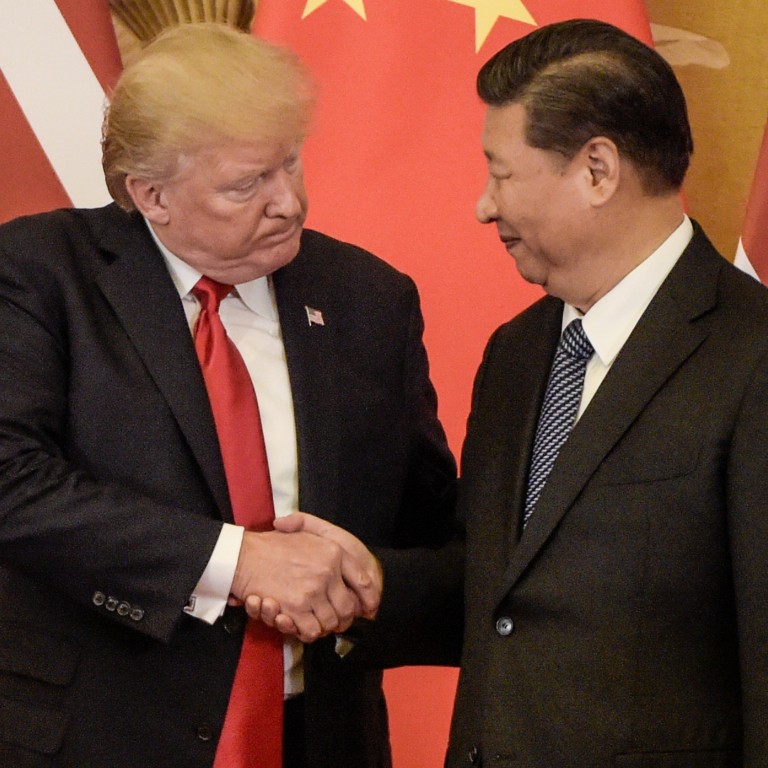
China signals currency war truce ahead of Xi Jinping’s meeting with Donald Trump at G20 in Japan
- US president confirms first meeting between the two world leaders since December will take place next week in Osaka
- The People’s Bank of China will sell 30 billion yuan (US$4.3 billion) worth of short terms bonds in Hong Kong next week to facilitate propping up the yuan
China has signalled its intention to not “weaponise” the yuan’s exchange rate as a message of good faith ahead of next week’s meeting between President Xi Jinping and US counterpart Donald Trump at the G20 summit in Japan, according to an analyst.
To facilitate propping up the yuan just days before the two world leaders meet in Osaka, The People’s Bank of China (PBOC), China’s central bank, will sell 20 billion yuan (US$2.9 billion) of one-month bonds and 10 billion yuan of six-month bonds in Hong Kong on June 26.
It would be the third such central bank bill sale in Hong Kong after issuance twice in 2018, when the central bank decided to start a programme to sell regular short-term yuan-denominated securities to better manage yuan liquidity overseas. The PBOC announced last week it would sell bills in Hong Kong later this month, without specifying when or how much.
“China is sending a good faith message to the US trade delegation that they have no intention of weaponise the yuan,” said Stephen Innes, managing partner at Vanguard Markets Singapore.
China is sending a good faith message to the US trade delegation that they have no intention of weaponise the yuan
“The US doesn’t want to remove tariffs until they have time to ensure 100 per cent compliance from China on trade issues. So this a further attempt to bridge the trust gap which is what’s been keeping these two sides apart on the tariff war.”
US President Trump said on Tuesday preparations would begin for the leaders to sit down after “a very good telephone conversation” with Xi, with analysts expecting that currency will form part of the discussions.
The US had previously demanded China limit the yuan’s depreciation, and thus the competitive advantage of China’s exporters to counter the impact of US tariffs on Chinese goods.
Local media cited Guo Tianyong, research director of the School of Finance at the Central University of Finance and Economics, as saying that the sale of PBOC bills was aimed at absorbing yuan funds to shrink the pool of yuan available outside the mainland. That would result in higher yuan interest rates, making it more expensive to short the yuan for foreigners and investors and thereby dampen depreciation pressure, Guo said.
The exchange rates of both onshore yuan traded in China, and offshore yuan traded outside the mainland, jumped on Wednesday, as financial markets were boosted by hopes of easing trade tensions and less pressure on the yuan.
The yuan has slid about 9 per cent to 6.91 against the US dollar from the onset of the trade war in April last year, although policymakers have prevented it from breaching the psychological threshold of 7 to the US dollar.
“[So far] the PBOC have done a great job tempering bearish yuan expectations,” Innes from Vanguard Markets Singapore added. “After all, a weaker yuan does nothing to nurture the domestic capital markets with which will be called upon to do the heavy lifting to fund a considerable portion of the Belt and Road Initiative.
“Investors don’t want to worry about [yuan] currency [depreciation] risk that’s for sure.”
Total yuan bonds sold outside the mainland stood at US$2.1 billion in the second quarter, down from US$2.4 billion in the first quarter and US$4.8 billion in the same period last year, according to Refinitiv data.
Han Tan, market analyst at FXTM, however, warned that the US dollar strength, and thus yuan depreciation pressure, may continue should the US Federal Reserve adopt a less dovish than expected tone at its policy meeting on Thursday.
“Markets have been desperate for some glimmer of hope on the trade front, and Trump’s latest tweet once again underscores the fluidity surrounding US-China relations while proving that market sentiment can still turn on a dime,” Tan said.
The bill sales could expand the number of yuan investment products that can be bought by foreign investors, as well as improve the pricing on Hong Kong’s yuan-denominated yield curve, the PBOC said last week.
Subscription to previous central bank bond sales came from international commercial banks, funds, investment banks, central banks and international financial organisations in Hong Kong.

